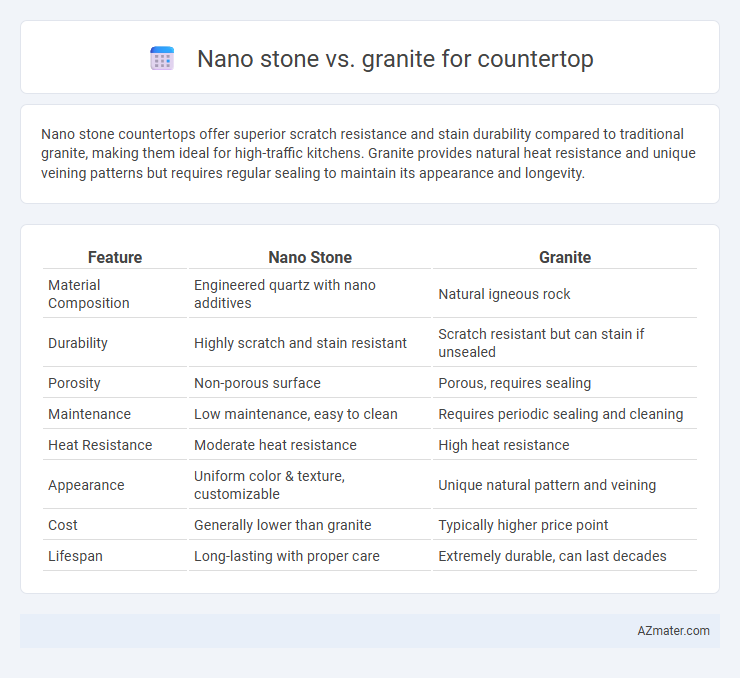Nano stone countertops offer superior scratch resistance and stain durability compared to traditional granite, making them ideal for high-traffic kitchens. Granite provides natural heat resistance and unique veining patterns but requires regular sealing to maintain its appearance and longevity.
Table of Comparison
| Feature | Nano Stone | Granite |
|---|---|---|
| Material Composition | Engineered quartz with nano additives | Natural igneous rock |
| Durability | Highly scratch and stain resistant | Scratch resistant but can stain if unsealed |
| Porosity | Non-porous surface | Porous, requires sealing |
| Maintenance | Low maintenance, easy to clean | Requires periodic sealing and cleaning |
| Heat Resistance | Moderate heat resistance | High heat resistance |
| Appearance | Uniform color & texture, customizable | Unique natural pattern and veining |
| Cost | Generally lower than granite | Typically higher price point |
| Lifespan | Long-lasting with proper care | Extremely durable, can last decades |
Introduction to Nano Stone and Granite Countertops
Nano stone countertops are engineered surfaces composed of finely ground natural minerals bonded with advanced resins, offering exceptional durability, stain resistance, and a non-porous structure ideal for kitchen use. Granite countertops, formed from natural igneous rock, provide unique, natural patterns and high heat resistance, making them a timeless choice in luxury kitchen designs. Both materials demand minimal maintenance but differ in their composition, aesthetic variability, and performance characteristics essential for informed countertop selection.
Composition and Material Properties
Nano stone countertops are engineered from a blend of natural quartz, epoxy resin, and engineered nanomaterials, offering enhanced durability and stain resistance compared to natural stones. Granite is a natural igneous rock composed mainly of quartz, feldspar, and mica, known for its hardness and heat resistance but prone to porosity without proper sealing. The nanotechnology in nano stone creates a non-porous surface that is less susceptible to scratches and bacterial growth, whereas granite requires regular maintenance to preserve its structural integrity and appearance.
Aesthetic Differences: Colors and Patterns
Nano stone countertops offer a sleek, uniform appearance with consistent colors and subtle patterns, ideal for modern and minimalist kitchen designs. Granite showcases natural, unique veining and a wide spectrum of color variations, making each slab a one-of-a-kind statement piece. The choice between Nano stone and granite largely depends on the desired aesthetic, with Nano stone favoring contemporary elegance and granite delivering organic, timeless beauty.
Durability and Scratch Resistance
Nano stone countertops offer superior scratch resistance due to their non-porous, reinforced surface composed of engineered quartz and resin, making them highly durable against daily wear. Granite, while naturally hard and heat-resistant, is more prone to scratching and requires periodic sealing to maintain its durability and prevent staining. In terms of long-term performance, nano stone provides enhanced durability and minimal maintenance compared to granite, making it ideal for high-traffic kitchen environments.
Maintenance and Cleaning Requirements
Nano stone countertops offer superior stain resistance and require minimal sealing compared to granite, making maintenance simpler and less frequent. Granite surfaces demand regular sealing, typically once a year, to prevent stains and maintain durability, along with periodic deep cleaning to avoid buildup. Both materials benefit from using pH-neutral cleaners, but nano stone's non-porous structure significantly reduces the risk of bacterial growth and ease of cleaning.
Heat and Stain Resistance Comparison
Nano stone countertops offer superior heat resistance compared to granite, withstanding temperatures up to 650degF without damage, whereas granite generally tolerates heat up to 480degF but can crack under sudden temperature changes. In terms of stain resistance, nano stone is non-porous and highly resistant to staining from substances like wine, coffee, and oils, requiring minimal sealing, while granite is naturally porous and needs regular sealing to prevent stains and bacterial growth. The advanced composition of nano stone ensures longer-lasting durability and easier maintenance in high-traffic kitchen environments compared to granite.
Environmental Impact and Sustainability
Nano stone countertops are manufactured using engineered materials with lower environmental impact due to reduced quarrying and energy consumption during production compared to natural granite. Granite extraction involves significant ecological disruption and extensive mining, resulting in higher carbon emissions and resource depletion. Nano stone offers enhanced sustainability by using recycled materials and longer-lasting durability, minimizing waste and the need for frequent replacement in kitchen applications.
Cost and Budget Considerations
Nano stone countertops typically cost less than granite, making them a budget-friendly option for homeowners seeking durability and aesthetic appeal. Granite prices vary widely depending on the rarity and origin of the stone, often resulting in higher upfront expenses and installation fees. Choosing nano stone can reduce total project costs due to lower material prices and easier maintenance requirements over time.
Installation Process and Versatility
Nano stone countertops offer a lightweight installation process due to their thin, flexible slabs that can be easily cut and shaped, reducing labor time and costs compared to granite. Granite requires more intensive installation with heavy slabs that demand professional handling, precise cutting, and strong support structures to prevent cracking. Nano stone is highly versatile, available in various colors and finishes that mimic natural stone, making it suitable for curved surfaces and contemporary designs, while granite excels in traditional aesthetics but has limited adaptability in irregular spaces.
Choosing the Right Material for Your Needs
Nano stone countertops offer exceptional durability and resistance to scratches, stains, and heat, making them ideal for high-traffic kitchens. Granite provides a natural, unique aesthetic with strong heat resistance but requires regular sealing to maintain its durability and prevent staining. Selecting between nano stone and granite depends on your preference for maintenance, appearance, and long-term durability in your kitchen environment.

Infographic: Nano stone vs Granite for Countertop
 azmater.com
azmater.com